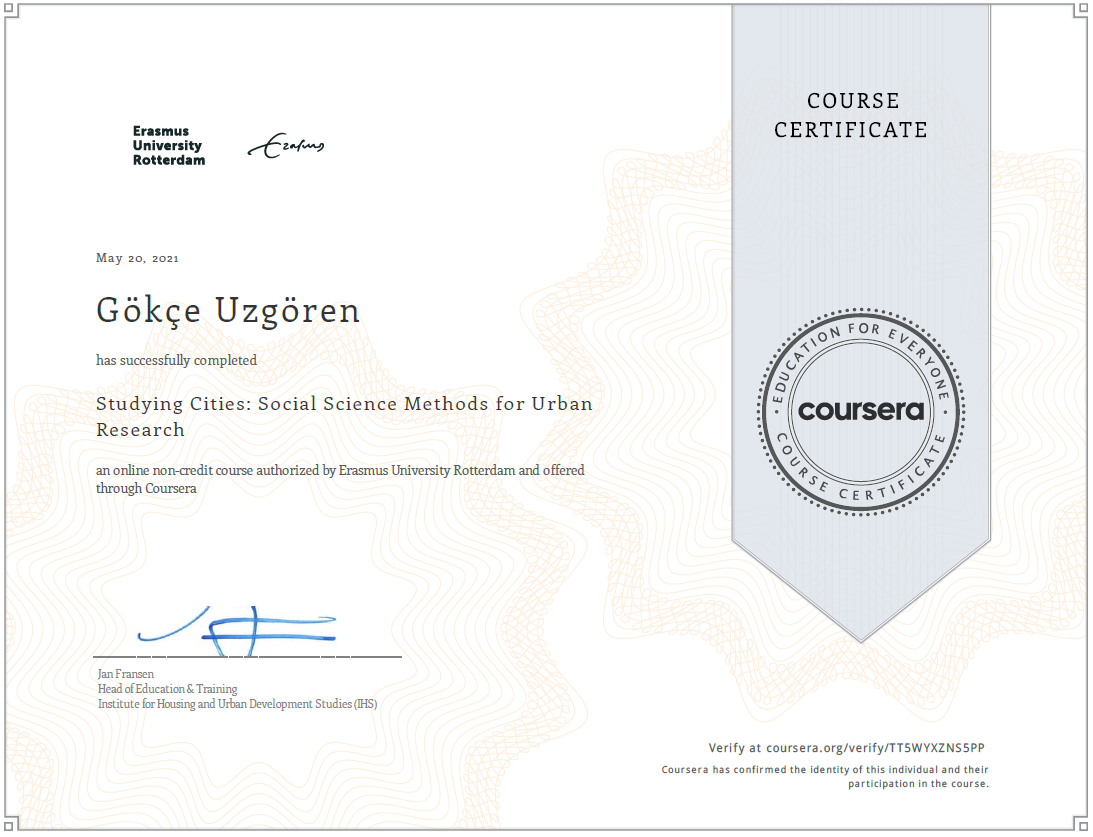Res. Asst. Gökçe Uzgören, Department of Interior Architecture and Environmental Design at Istanbul Gelisim University (IGU) Faculty of Fine Arts (GSF), training titled "Studying Cities: Social Science Methods for Urban Research" given by Erasmus University Rotterdam, Institute for Housing and Urban Development Studies (IHS). completed. Res. Asst. Gökçe Uzgören, who completed the quizzes held at the end of each week and the final work presented in the fifth week, during the five-week training period between April 16, 2021, and May 20, 2021, was entitled to receive a certificate.
Aiming to gain knowledge about the different steps of the research cycle in scientific studies and to lay a foundation for future research, the training was delivered online by researchers from the Institute for Housing and Urban Development Studies (IHS), Jan Fransen, Laura Neijenhuis, Dorcas Nthoki, Rick Wolff and Maria Zwanenburg.
Res. Asst. Gökçe Uzgören shared her thoughts on education as follows:
“Determining the method we will adopt in scientific studies is a critical point for most researchers. Because once you determine the right method, it becomes very easy to manage and complete your research. For the mixed method that I planned to use in my doctoral study, it was extremely important to learn both qualitative and quantitative research methods. For this reason, I aimed to make up for my shortcomings by participating in this training and I can say that I saw a lot of benefits. Even though it is a bit difficult that it takes five weeks and there is a quiz at the end of each week, I am very happy to have received such a certificate on research methods in urban studies. In addition, in the last week of the training, a study such as examining and evaluating the work of other researchers participating in the training is also carried out. This allowed me to have information about current research in many different countries. One of the advantages of the pandemic process is that it offers the opportunity to receive online training from well-equipped researchers from universities at one end of the world. It is up to us to seize these opportunities.”
The topics of the five-week training and the competencies gained are as follows:
1st. Week-Research Topic:
-
Gain an understanding of the criteria for problem definition, the main components of research design, and how to formulate a good research question.
-
Developing tools for assessing the quality of research questions according to said criteria when conducting scientific research.
-
QUIZ
2nd. Week-Conceptual Framework and Operationalization:
-
Understand how operationalization transforms theory into empirical research.
-
Transforming the research question into a conceptual framework and its complex concepts into measurable (precise) indicators,
-
To grasp the most common mistakes made in operationalization processes.
-
QUIZ
3rd Week-Research Strategies:
-
To learn more about possible strategies or approaches in experimental research,
-
To learn about the survey, quasi-experiment, case study, and desk research (working with existing large datasets) which are the main strategies in social science research.
-
To be able to choose appropriate methods and techniques for a research question. Week-Quantitative and
4th. Week-Qualitative Data:
-
Fundamentals of data collection,
-
Primary quantitative data collection (survey) and secondary quantitative data collection (large datasets available),
-
To learn about primary (interviews) and secondary (available literature) qualitative data collection.
-
QUIZ
5th. Week-Quantitative and Qualitative Analysis:
-
Ability to analyze different types of data,
-
Final test covering the knowledge gained throughout the entire course.
-
Final paper submission and evaluation of other researchers' work.
We congratulate Res. Asst. Gökçe Uzgören and wish her continued success.



